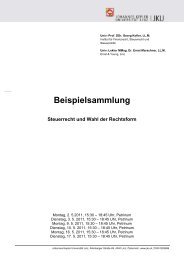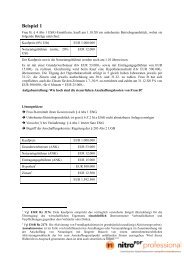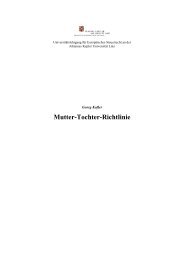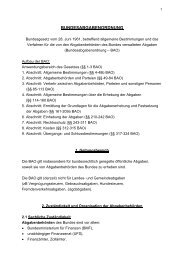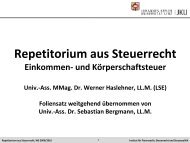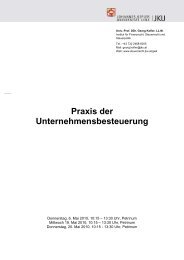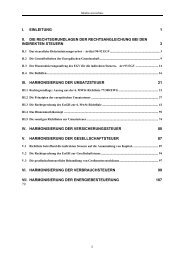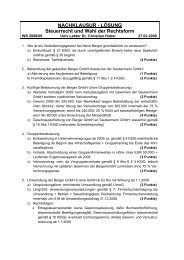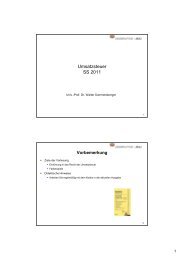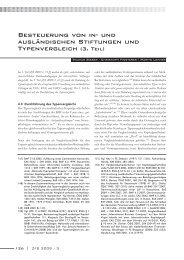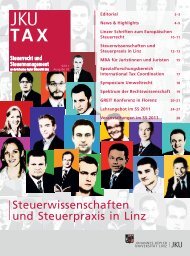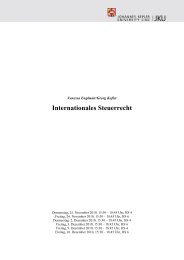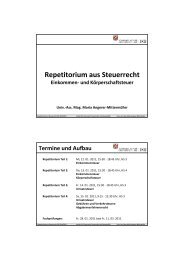European Tax Law - JKU
European Tax Law - JKU
European Tax Law - JKU
Erfolgreiche ePaper selbst erstellen
Machen Sie aus Ihren PDF Publikationen ein blätterbares Flipbook mit unserer einzigartigen Google optimierten e-Paper Software.
tions”. 29 According to this position, the ECJ has no legal<br />
authority to eliminate cumulative administrative burdens,<br />
economic double taxation or even juridical double<br />
taxation resulting from the juxtaposition of national tax<br />
rules on the basis of the rules dividing and allocating<br />
national tax jurisdiction.<br />
I respectfully disagree with this position. Cumulative<br />
burdens, economic and juridical double taxation, even<br />
when they result from the parallel and non-discriminatory<br />
exercise of tax jurisdiction, are clearly in contradiction<br />
with the basic concept of the internal market. As<br />
indicated above, these instances of double taxation can<br />
be removed not only by tax treaties and secondary Community<br />
legislation like directives and regulations, but<br />
also by Community jurisprudence on the basis of the<br />
supremacy of the fundamental freedoms. In its case law,<br />
the ECJ has made a distinction between establishing the<br />
criteria determining tax jurisdiction and the rules by<br />
which the Member States exercise tax jurisdiction. The<br />
former are outside the scope of scrutiny by the ECJ, the<br />
latter are within.<br />
First, the distinction between the rules determining tax<br />
jurisdiction and the rules exercising tax jurisdiction is<br />
not an easy one to make. When a Member State determines<br />
that a person or company is a resident within the<br />
ambit of its tax system, is the Member State determining<br />
its jurisdiction or is it interpreting its national tax law<br />
and exercising its jurisdiction? When a Member State<br />
determines that interest income is connected to a permanent<br />
establishment in its territory, it decides at the<br />
same time that the interest income is business income<br />
and therefore income from a permanent establishment<br />
falling within its tax jurisdiction. By deciding that the<br />
interest income is connected to the permanent establishment,<br />
the Member State has interpreted its rules on<br />
interest income as business income or as private investment<br />
income and therefore exercised its taxing power<br />
within its jurisdiction. But the consequence of applying<br />
this rule is that the income from a permanent establishment<br />
belongs to its tax jurisdiction and that means it is<br />
defining its tax jurisdiction. I find it difficult to make the<br />
intellectual distinction between the two parts of this single<br />
decision.<br />
Second, there is no reason of principle why rules “exclusively”<br />
determining tax jurisdiction should be out of<br />
bounds when applying the fundamental freedoms, at<br />
least if we accept the concept of the internal market as<br />
the guiding principle for deciding cases under the EC<br />
Treaty. There is long-standing case law that the fact that<br />
a particular area of (tax) law has not yet been harmonized<br />
is no excuse for not applying the fundamental<br />
freedoms to this area. In other words, the fact of nonharmonization<br />
means that the Member States are indeed<br />
still free to legislate or to conclude tax treaties, but these<br />
treaties and tax laws, including the existing laws, must be<br />
in conformity with the dominating provisions of the EC<br />
Treaty. There is also no legal basis for “carving out” the<br />
international rules determining tax jurisdiction, either<br />
in the EC Treaty or elsewhere. The reason why the ECJ in<br />
Articles<br />
Gilly held that the tie-breaker rule of nationality did not<br />
constitute discrimination was not that the ECJ had no<br />
jurisdiction to rule on this question, but that it was a reasonable<br />
rule which in itself had no discriminatory effect.<br />
A rule merely determining which state has the power to<br />
tax is almost always absolutely neutral as to the operation<br />
of the internal market and therefore cannot under<br />
any circumstances be discriminatory. The result of<br />
applying this rule may well be that a taxpayer exercising<br />
his right to free movement pays more tax in the new<br />
Member State. But that result is not in contradiction<br />
with the internal market. The objective of the internal<br />
market is not to erase all tax differences between the<br />
Member States, but, among other things, to erase the<br />
double burdens occurring in the exercise of the basic<br />
freedoms.<br />
In this respect, it is of great interest to find out precisely<br />
the scope of the international rules determining tax<br />
jurisdiction. These rules are simple and few in number.<br />
Their only purpose is to determine which state is entitled<br />
to tax. Residence and source in the national territory<br />
and sometimes nationality are the criteria on the basis of<br />
which tax jurisdiction is divided between states. Here I<br />
would like to point out that the act of determining tax<br />
jurisdiction is restricted to the decision of a state to tax<br />
residents (in principle on their worldwide income) or to<br />
tax non-residents (on their income from the national<br />
territory).<br />
29. See several opinions by Advocate-General Geelhoed in Case C-374/04,<br />
Test Claimants Class IV of the ACT Group Litigation, 23 February 2006, Paras.<br />
36-39: “... in the direct taxation sphere, there is no practical difference between<br />
these two manners of formulation i.e. ‘restriction’ and ‘discrimination’. What is<br />
essential, however, is to distinguish between two senses of the term ‘restriction’<br />
when dealing with direct tax rules. The first refers to restrictions resulting<br />
inevitably from the co-existence of national tax systems. In accordance with<br />
Member State competence for the area in the present state of Community law,<br />
direct tax within the E.U. is governed by co-existing discrete and varied<br />
national tax systems. Certain disadvantages for companies active in crossborder<br />
situations result directly and inevitably from this juxtaposition of systems<br />
and in particular: (1) from the existence of cumulative compliance burdens<br />
for companies active cross-border; (2) the existence of disparities<br />
between national tax systems; and (3) the necessity to divide tax jurisdiction,<br />
meaning dislocation of tax base ....<br />
... The use of the term ‘restriction’ – although employed in the Court’s<br />
case law – is in this context misleading. In reality, at issue here are distortions<br />
of economic activity resulting from the fact that different legal systems must<br />
exist side-by-side. In certain cases these distortions provide disadvantages for<br />
economic actors; in other cases, advantages. While in the first case they are<br />
‘restrictive’, in the second case they stimulate cross border establishment activity.<br />
Although the Court is as a rule faced with what can be termed ‘quasirestrictions’<br />
flowing from these distortions, one should not forget that there is<br />
a second side to the coin – that is where particular advantages arise from the<br />
cross border establishment .... The causes and character of these ‘quasi-restrictions’<br />
mean that they may only be eliminated through the intervention of the<br />
Community legislator, by putting in place a cohesive solution on an EU-wide<br />
scale, that is an EU-wide tax system. In the absence of an EU-wide tax solution,<br />
therefore such quasi-restrictions should be held to fall outside the scope<br />
of Article 43 EC.”<br />
Case C-513/04, Kerckhaert-Morres, 6 April 2006, Paras. 30-31: “In this<br />
regard, I would recall that the free movement provisions of the Treaty do not<br />
as such oblige home states to relieve juridical double taxation resulting from<br />
the dislocation of tax base between two Member States ... the possibility of<br />
juridical double taxation, in the absence of priority rules between the relevant<br />
States, is an inevitable consequence of the generally accepted method under<br />
international tax law of dividing tax jurisdiction between States – that is, the<br />
distinction between home State taxation (worldwide taxation of residents)<br />
and source State taxation (territorial taxation of non-residents). Under Community<br />
law, the power to choose criteria of, and allocate, tax jurisdiction lies<br />
purely with the Member States, as governed by international tax law.”<br />
© IBFD BULLETIN FOR INTERNATIONAL TAXATION MARCH 2008 97




